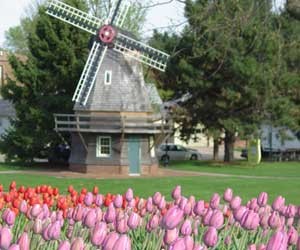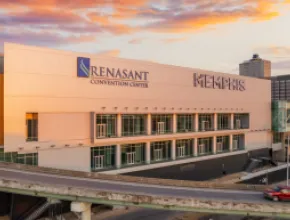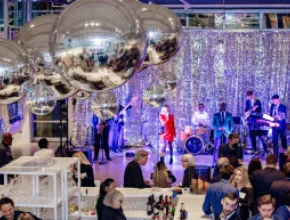Iowa is simultaneously the archetypal Upper Midwest state and a symbol of how the entire U.S. may change in the 21st century. While its German, Czech-Slovak and Dutch heritage remain strong, immigrants from Latin America and East Africa bring new vitality to its small towns.
While Iowa farms still grow all the corn and soybeans its farmers can sell, it also participates in a quiet revolution in biofuels and wind power. And while Iowa may seem distant from big regional cities, a network of interstates and airports has helped draw the state steadily closer to its neighbors.
For meeting planners, the state’s combination of progress and preservation bodes well for successful events.
Des Moines/Ames
Des Moines is Iowa’s capital and the headquarters for the lion’s share of state associations and agencies. Like many Iowa cities, it straddles a river, with the primary government offices and a beautiful capitol building to the east and the campus of Drake University to the west, plus plentiful riverside parks.
The city’s other major businesses are insurance and the quadrennial Iowa caucuses that kick off the major-party presidential race, inspiring many candidates and media outlets to set up shop here for months or years.
Greg Edwards, president and CEO of the Greater Des Moines CVB, is bullish about Des Moines’ prospects.
"With the improvements we’ve done in the last 10 years—a new convention center, a new arena, a totally revitalized downtown with a new science center, a new $40 million sculpture park, new hotels—it gives us more product to sell, and we can go after larger regional groups," Edwards says.
Meetings-friendly properties include the historic Renaissance Des Moines Hotel Savery and the beautiful Hotel Fort Des Moines, plus numerous chain properties. Between the Iowa State Fairgrounds and the Iowa Events Center (including the Hy-Vee Hall/Veteran’s Memorial Auditorium, Wells Fargo Arena and Polk County Convention Complex), planners will find that large groups are covered.
When you’re hungry, just follow state legislators to restaurants such as the 801 Steak and Chop House, Johnny’s Italian Steakhouse or the Iowa Beef Steakhouse.
Attractions include walking through the Pappajohn Sculpture Park, seeing AAA Iowa Cubs baseball at Principal Park, taking in Broadway performances at the Civic Center of Greater Des Moines, or making your own chocolates at Suzette Candies.
To the northeast, Ames is home to Iowa State University, where agriculture and technology will meet at the new BioCentury Research Farm here. This facility will both grow biofuels crops and test ways to scale up their production—and with biomass-conversion and wind-power facilities nearby, Ames has developed alternative-energy tours that appeal to a wide range of professionals.
Downtown Ames’s Main Street Cultural District features a microbrewery, a chocolate shop, restaurants and antique stores. Large meetings venues include the Central Iowa Expo site and the Stephens Auditorium and Hilton Coliseum, while meetings-friendly lodgings include the Gateway Hotel & Conference Center, Holiday Inn Ames Conference Center and Best Western University Park Inn & Suites.
Pella
Located between Des Moines and Iowa City, Pella was originally a Dutch American colony and still embraces that heritage. Its skyline is dotted with windmills and downtown has an Old World charm—complete with a canal—that perfectly complements the annual Tulip Festival. Properties such as the Royal Amsterdam Hotel and Bos Landen Golf Resort welcome meetings, while unique spouse programs such as windmill tours and wooden-shoe painting classes complete the picture of a unique destination.
In nearby Ottumwa, Bridge View Center is a 92,000-sqare-foot events facility with multiple meeting rooms, an exposition hall and a theater.
Mason City/Waterloo/Marshalltown
Mason City is located midway between Minneapolis, Iowa City and Des Moines, and is considered the home of Frank Lloyd Wright’s Prairie School of architecture. The last-surviving Wright-designed hotel, the Historic Park Inn, will reopen here in spring 2011 following an $18.5 million renovation. Wright and his devotees also built several adjacent blocks of downtown Mason City along Prairie School lines.
Mason City was also home to Meredith Wilson, creator of The Music Man. His life is commemorated at Music Man Square, which recreates the feel of "River City, USA" from the Broadway play and film.
"You immediately feel part of the movie because you’re on this set. There’s a working ice-cream parlor, for instance," says Sue Armour, executive director of the Mason City CVB.
Meetings facilities include the Holiday Inn Mason City as well as the Muse-Norris Conference Center at Northern Iowa Area Community College.
Waterloo is situated on the Cedar River and, having successfully withstood the 2008 floods, continues beautifying its downtown through the Cedar River Renaissance program, whose projects include a proposed Riverwalk Loop of pedestrian/bicycle trails and a riverside amphitheatre. Performances will be visible from boats on the water.
Cultural facilities here include the Five Sullivan Brothers/Iowa Veterans Museum that examines Iowans’ roles in wartime, plus the Grout Museum of History & Science and the Dan Gable International Wrestling Institute & Museum.
Hotel facilities include the Isle Casino Hotel Waterloo, Hampton Inn & Suites and Fairfield Inn. In addition, the Ramada Hotel & Convention Center participates in the Green Cedar Valley initiative by focusing on recycling, composting and reusability.
Closer to Des Moines is Marshalltown, a manufacturing center now reinventing itself as a cultural and meetings hub. Marshalltown has a large number of meeting and conference facilities for its size, which Marshalltown CVB director Shannon Espenscheid attributes to local companies’ need to do training nearby.
"Businesses like Emerson Processing, Lennox and Mechdyne needed to bring people in for meetings and training, so we have a conference center here, and our community college has meetings facilities," Espenscheid says.
The city features a historic Main Street and the classic Orpheum Theater, which will reopen in June 2010. The Best Western Regency Inn and Conference Center is a meetings-ready property, while the Hampton Inn and AmericInn also have function space.
Cedar Rapids/Amana Colonies
Cedar Rapids continues its remarkable recovery from the 2008 floods, especially considering that in dollar terms, the floods were America’s fourth-worst natural disaster, says Susan Lloyd, convention marketing manager at the Cedar Rapids Area CVB.
"Much of our private-sector rebuilding is done, and you would never know there had been any impact," Lloyd says. "Our community theater reopened in February, and a lot has come back way better than it was before the flood."
For example, the U.S. Cellular Center arena will undergo upgrades to make it state-of-the-art, but the city will also construct a 60,000-square-foot addition by closing an adjacent street and building on the resulting space. Downtown restaurants and shops are also on the rebound.
Meetings-friendly properties include the Crowne Plaza Five Seasons Hotel, Cedar Rapids Marriott and the Best Western Longbranch Hotel & Convention Center, and the Clarion Hotel & Convention Center is focused on becoming the city’s greenest hotel through renovations to improve its environmental efficiency.
Southwest of Cedar Rapids are the Amana Colonies, a cluster of small towns whose German heritage and output of meats, furniture, crafts, wine and beer attract visitors. This area’s largest meeting facility, the Amana Pioneer Building, seats up to 350 for banquets and is complemented by smaller facilities such as the Ronneburg Restaurant and the Ox Yoke Inn.
Iowa City/Coralville
The University of Iowa (UI) in Iowa City was hard-hit by 2008’s floods but is bouncing back as meetings-friendly spaces such as the Iowa Memorial Union and Iowa House Hotel have reopened, says Eric Heinkel, convention sales manager at the Iowa City/Coralville CVB.
"We’ve definitely seen a lot of progress [and] a lot of the businesses along the Coralville Strip have recovered," Heinkel says.
Iowa City lies on a bluff overlooking the Iowa River and offers an array of restaurants and shops, including One Twenty Six and the Motley Cow for dinner plus the famed Prairie Lights bookstore for browsing.
Rowing is one highlight of university athletics, and planners can rent the crew team’s new Beckwith Boathouse, while the press box at Kinnick Stadium is another unique venue.
Other meeting venues here include the UI Athletics Hall of Fame, the Englert Theatre and hotels such as the Coralville Marriott Hotel & Conference Center, Hotel Vetro and the Sheraton Iowa City, which recently finished a renovation of its guest rooms, lobby, pool area and 11,000 square feet of meeting space.
Just south of Iowa City is Riverside, home to the Riverside Casino and Golf Resort.
Dubuque
Dubuque lies on the Mississippi River and attracts groups from both Iowa and neighboring states. Its elegant, 86,000-square-foot Grand River Center offers spectacular Mississippi views from its meeting rooms, while the Grand Harbor Resort & Waterpark, Diamond Jo Casino and the Hotel Julien provide guest rooms and additional meeting space. The Julien recently finished a $36 million renovation, and now includes a spa, numerous meeting spaces and a restaurant with private dining rooms.
The city continues the America’s River project to revitalize the Port of Dubuque, with the newest piece being the reopening in mid-2010 of the popular National Mississippi River Museum & Aquarium, including more hands-on exhibits and a new large-format theater. Other attractions here include the Fenelon Place Elevator (the world’s shortest, steepest railway), the Dubuque Star Brewery and Dubuque River Rides sightseeing and dinner cruises. Just west of Dubuque is Dyersville, where the Field of Dreams movie site is a top attraction.
Quad Cities
The Quad Cities face each other across the Mississippi, with Moline/East Moline and Rock Island in Illinois and Davenport and Bettendorf in Iowa. The four combine to offer planners surprising flexibility through a formidable number of guest rooms, attractions and meeting spaces.
The cities connect themselves through the Loop, a circulator-type bus system with a route that runs both clockwise and counterclockwise through all four cities’ downtowns. Attractions include the Figge Art Museum, Quad City Symphony Orchestra, Great Mississippi Valley Fairgrounds and Mississippi River cruises.
While corporate business may be slow, leisure travel within the Midwest and non-corporate meetings are taking up some of the slack, says Lynn Hunt, vice president of sales at the Quad Cities CVB.
"We’re seeing some good return on the religious market and in sporting events," Hunt says. "That’s kind of the last thing families cut from their budget: travel with their kids who are going to tournaments."
In partnership with the Isle Casino Hotel, Bettendorf opened the Quad Cities Waterfront Convention Center in 2009 with 24,000 square feet of meeting space plus a skywalk connection with the Isle Hotel.
Other meetings-friendly properties here include Davenport’s RiverCenter and the adjoining Radisson Quad City Plaza Hotel. In addition, the boutique Blackhawk Hotel will open in Davenport in December 2010 with 130 rooms.
Burlington
In Iowa’s southeast, Burlington is noted as a manufacturing center and for Snake Alley, one of the world’s crookedest streets. Its industry and proximity to Missouri and Illinois make it a meetings crossroads.
A top group choice is the Pzazz! complex, which includes the Pzazz! Event & Convention Center, Catfish Bend Casino, Catfish Bend Inn & Spa and Fun City amusement park.
Council Bluffs/Sioux City
In 2009, Council Bluffs saw a big spike in visitation—about 10 million visitors—at least partly thanks to the Register Annual Great Bike Ride Across Iowa (RAGBRAI) beginning here. That’s the way it is when you’re a sports and gaming hub straddling two states, as Josee Beier, director of convention sales at the Council Bluffs CVB, explains.
"We have a lot of sporting events—wrestling, AAA baseball, a half marathon, World Wrestling [Federation] tryouts, the conventions that come through," Beier says. "And we’re just 10 minutes from the Omaha airport."
Of course, Council Bluffs has Iowa’s three largest casinos—the Ameristar Casino Hotel, Harrah’s Council Bluffs Hotel & Casino and Horseshoe Council Bluffs Hotel & Casino—right across the Missouri River from gaming-hungry Nebraska. In late 2009, the Horseshoe opened a Hilton Garden Inn while the Ameristar debuted a Holiday Inn and Suites.
Other meetings venues here include the MidAmerica Center, which has an attached SpringHill Suites and Country Inn & Suites, and a Best Western. The city’s trail system leads to the new Bob Kerrey Pedestrian Bridge, which lets people stroll or pedal across the Missouri River from Council Bluffs to Omaha.
Sioux City will kick off this year’s RAGBRAI ride and expects around 20,000 visitors for this single event. The number suggests the capabilities of this Missouri River city of 85,000, whose attractions range from nature centers and ice-skating to museums and a symphony.
Popular meetings options here include the Sioux City Convention Center, the Stoney Creek Inn & Conference Center and the Holiday Inn Downtown.
In Northwest Iowa, options include the Arrowwood Resort & Conference Center and the Inn at Okoboji in Okoboji and King’s Pointe Resort in Storm Lake.
Paul D. Kretkowski ate his way through Iowa City’s cafes and restaurants for two years, and may go back for seconds.






